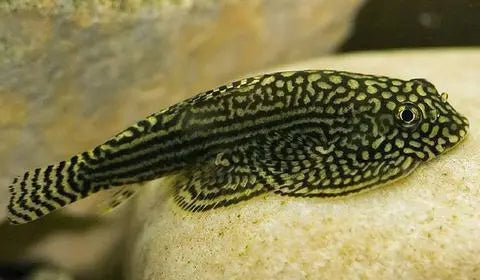🐟 Hillstream Loach Care Guide (Sewellia lineolata & related species)
🌟 Overview The Hillstream Loach is a fascinating bottom-dwelling fish known for its unique body shape that resembles a miniature stingray. Native to fast-flowing rivers and streams of Asia, these loaches thrive in high-oxygen environments with cool, clean water. They are excellent algae grazers and make a great addition to river-style or planted aquariums.
🔑 Quick Facts
- Scientific Name: Sewellia lineolata (and related species)
- Common Name: Hillstream Loach, Borneo Sucker, Butterfly Loach
- Size: 2–3 inches (5–7.5 cm)
- Lifespan: 8–10 years
- Temperament: Peaceful, bottom dweller
- Care Level: Moderate
🏠 Tank Requirements
- Minimum Tank Size: 30 gallons (larger preferred for groups)
- Water Temperature: 68–75°F (20–24°C)
- pH: 6.5–7.5
- Hardness: 5–15 dGH
- Water Flow: Moderate to strong, well-oxygenated
- Substrate: Smooth sand/gravel with rocks and driftwood for grazing
🍽️ Diet
Hillstream Loaches are primarily algae grazers but should be supplemented with:
- Algae wafers and sinking pellets
- Blanched vegetables (zucchini, cucumber, spinach)
- Live/frozen foods: bloodworms, brine shrimp, daphnia
🧑🤝🧑 Tank Mates
- Peaceful fish: rasboras, danios, tetras, corydoras, shrimp, snails
- Avoid aggressive fish or fin-nippers
- Best in groups of 3 or more for natural behavior
🧠 Behavior & Tips
- Require high oxygen and water movement (use powerheads, sponge filters, or air stones)
- Excellent algae controllers but not a substitute for a clean tank
- Thrive in well-established aquariums with natural algae and biofilm
- Enjoy grazing on smooth surfaces like rocks and driftwood
❓ FAQ
Q: Are Hillstream Loaches good algae eaters?
A: Yes, they specialize in grazing algae and biofilm on surfaces.
Q: Can they live in tropical community tanks?
A: They prefer cooler, fast-flowing water. Avoid warm tropical setups above 78°F.
Q: How long do they live?
A: With proper care, Hillstream Loaches can live 8–10 years.
Q: Do they need groups?
A: Yes, they are more active and social in small groups of 3+.
